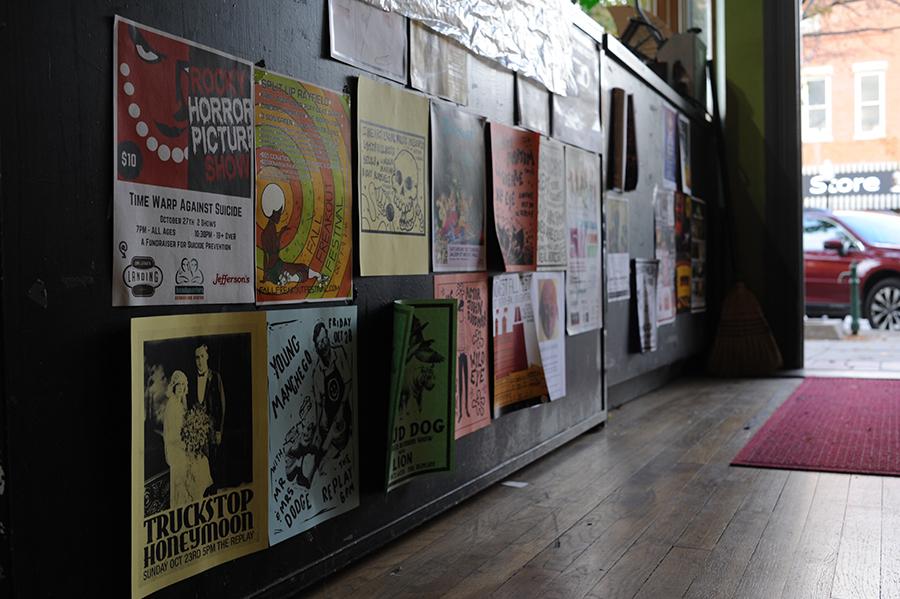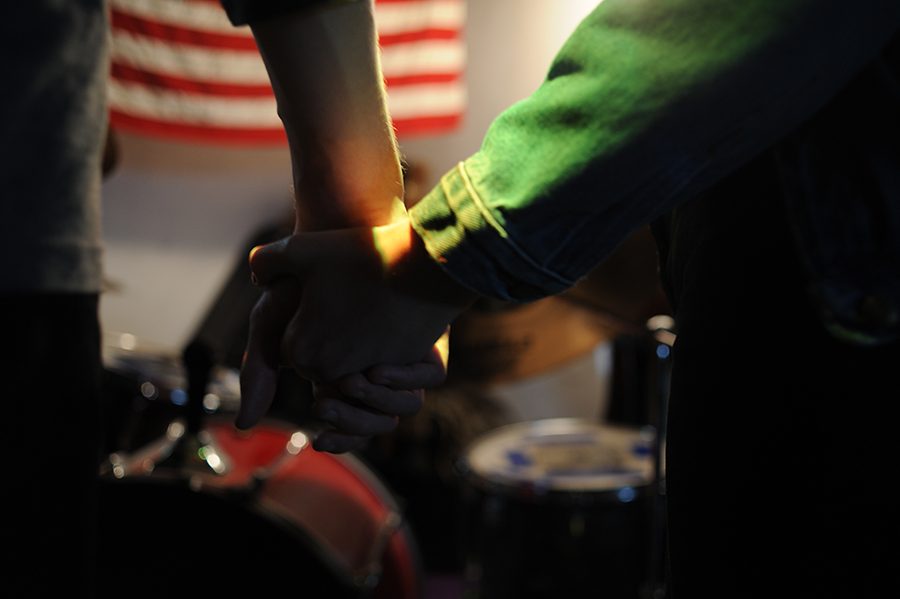‘Our Scene’ invites underrepresented youth to safely engage in music community
October 12, 2016
‘Our Scene’ hopes to incorporate ‘buddies’ into the Lawrence music community and provide a sense of security for individuals in need at events.
The year is 1985. Heads peck the air enthusiastically back and forth as a young man with glasses begins to slam on the drums in front of him. The lights are dimmed. A few booming voices of men from the audience drown out the rest of the cheering crowd. The Embarrassment, a punk rock band from Wichita, Kansas have made it up to Cogburn’s for the night. Most of the crowd nods along, some begin to push and shove. As the crowd grows more rowdy, a pair of young men in their early twenties grasp each other’s arms, locking in a brief struggle against each other. Others look on, drifting farther to the edge of the crowd.
The year is 2016. The Bottleneck, formerly known as Cogburn’s, hosts an album release party for a local band. The crowd is anxious to get started. Heads bob. A group of tall young men gather towards the front, they begin bouncing, pushing, shoving. Bodies collide and sweat mixes together. Someone grabs a young girl’s ponytail and yanks on it from behind her. As the night goes on, the group at the front persists, while others are pushed farther to the edge of the crowd.
For the first time, the trend of of aggressive male audience members is facing an organized opposition in the form of a LGBTQ+ advocating, minority inclusive, safe space supporting group, ‘Our Scene’.
‘Our Scene’ aims to “provide representation and a safe space for femme identifying people and people of color so that they can actually be a part of the scene, and not be on the borders of the scene and feel unsafe,” ‘Our Scene’ leader, KU student and Free State alumni Sophia Coen said.

Fliers for local acts, events and shows decorate the surfaces of local downtown businesses.
The group formed this September with six core leaders, three of them Free State alumni, in response to an increasing awareness of discomfort felt by female identifying people at events.
“[T]here was a bit of outrage of mistreatment of people at shows,” senior and ‘Our Scene’ member Bailey Dixon said. “We knew that it should be public so we could be a voice for people who have experienced mistreatment at shows, like violence, threats and sexism.”
The group plans to support a feeling of security and unity at shows by creating a system of ‘buddies’. ‘Buddies’ will be ‘Our Scene’ members identified by a pin who can be approached in times of need or discomfort. The group also plans on coordinating with the Care Center to support victims of violence and sexual abuse, as well as a group for female musicians to support as many people in need as possible.
“When I was smaller only men played music in my life so it didn’t process for me” freshman Macie Orr said. “I listened to women who played music all the time…but I didn’t understand the struggles [female musicians] went through.”
Coen explains that outreach is important, as the discomfort felt by female identifying people in the scene is not an isolated problem.
At meetings, the group may have fifteen or more of its members gathered to discuss sensitive issues such as sexual assault. In order to keep communication as inclusive to survivors as possible, ‘Our Scene’ implements trigger warnings into their group discussions. Although they have sparked some debate on college campuses and in popular media, Coen insists that trigger warnings are essential to being respectful to other’s mental health and do not restrict personal liberties.
“‘Freedom of speech’ doesn’t validate making someone have a breakdown or mentally harming them,” Coen said. “It’s not like we’re not talking about the hard issues…trigger warnings don’t mean [we] drop the conversation forever.”
‘Our Scene’ plans to hold onto their principles as they move forward and to not lose sight of their original goals as the group expands.
“We support the idea of ‘dance don’t fight,’” Coen said. “That’s not what these shows are, that’s not what the musicians want, what the venues want. That’s what a select few people want, and we’re not going to be an audience for them fighting each other, or objects for them to sexualize.”

